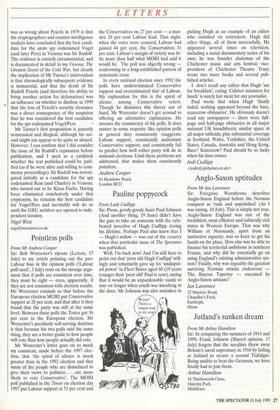Pointless polls
From Mr Andrew Cooper Sir: Bob Worcester's riposte (Letters, 17 July) to my article pointing out the pro- Labour bias in the opinion polls (`Labour poll-axed', 3 July) rests on the strange argu- ment that if polls are consistent over time, they must be right — even, apparently, if they are not consistent with election results. Mr Worcester reminds us that before the European election MORI put Conservative support at 28 per cent, and that after it they found that the party was still at the same level. Between these polls the Tories got 36 per cent in the European election. Mr Worcester's peculiarly self-serving doctrine is that because his two polls said the same thing, they are a better guide to how people will vote than how people actually did vote.
Mr Worcester's letter goes on to mock my comment, made before the 1997 elec- tion, that 'the spiral of silence is much greater than in the 1992 election and that many of the people who are disinclined to give their views to pollsters . . . are more likely to vote Conservative'. The MORI poll published in the Times on election day 1997 put Labour support at 51 per cent and the Conservatives on 27 per cent — a mas- sive 24 per cent Labour lead. That night, when the votes were counted, Labour had gained 44 per cent, the Conservatives 31 per cent. Labour's margin of victory was lit- tle more than half what MORI had said it would be. The poll was abjectly wrong — conforming to a long-established pattern of systematic error.
In every national election since 1992 the polls have underestimated Conservative support and overestimated that of Labour. My explanation for this is the spiral of silence among Conservative voters, Though he dismisses this theory out of hand, Mr Worcester doesn't get around to offering an alternative explanation. He stresses the consistency of his polls. It does matter in some respects: like opinion polls in general they consistently exaggerate Labour support, consistently understate Conservative support, and consistently fail to predict how well either party will do in national elections. Until these problems are addressed, that makes them consistently pointless.
Andrew Cooper
61 Henslowe Road, London SE22


























































 Previous page
Previous page